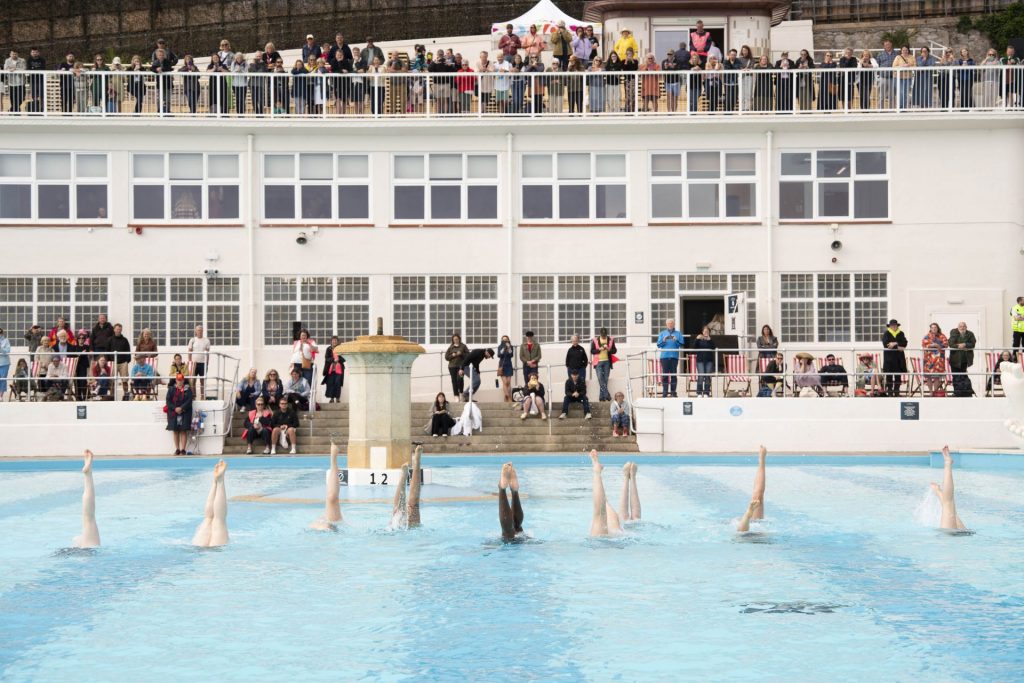On the spot where Sir Francis Drake played bowls while waiting for the invading Spanish Armada, and bull fights once took place, the Tinside lido sparkles like a jewel embedded in the Plymouth coastline. A squadron of seagulls dip and sway across the shore, and bodies of all sizes and complexions populate the waterfront, enjoying the piercingly hot July weather.
On the afternoon of my visit, preparations are afoot for a joyfully camp celebration of Plymouth’s cultural and maritime identity, which is billed as an afternoon of “local strong people, synchronised swimmers and live music”. Anyone unlucky enough not to secure a ticket for Hello Sailor! was invited to view proceedings from the Hoe Promenade. As it transpired, the event was a sell-out, in large part because it was the brainchild of the Turner prize-winning British artist Jeremy Deller. The Plymouth event was the final leg of his two-year project The Triumph of Art, produced in collaboration with the National Gallery, London, to celebrate its bicentenary.
Deller has been working with institutions across the UK, bringing participatory public art to Llandudno, Derry-Londonderry, Dundee, Plymouth (supported by The Box and Art Fund), and, on July 26, Trafalgar Square. Each episode has drawn on recurrent themes that loosely tie in with images in the National Gallery’s collection. Deller is especially interested in those that focus on mythology, celebration and what he calls “procession”.



Titian’s painting, Bacchus and Ariadne, a romping Renaissance cavalcade painted for the Duke of Ferrara in around 1523, provided a significant starting point. In the painting, drums beat and cymbals clash, while a menagerie of animals and revellers accompany Bacchus, the young god of wine, as he stumbles upon the mortal Ariadne, whom he is about to seduce.
Myth has been a central motif to each chapter of the project, some of which have been raucous, boundary-breaking spectacles of music, costume and local performers. Such exuberance is a reflection of Deller’s interest in the nature of human traffic in public spaces. “It’s definitely about people looking at people,” he says. “It’s just the idea of processions as a form of storytelling, people showing other people what they’re doing, what they’re into, what they like, and saying ‘I represent this’. Human beings cannot get enough of looking at other human beings and seeing what they do.”
The Plymouth procession has its own particular flavour, which, Deller says, derives from the “definite body culture that you get by the sea, because of swimming, because of the heat. I like that body culture down here.”
Of course, there is no shortage of idealised bodies within the walls of the National Gallery. These include the ubiquitous figure of Venus, mythological goddess of love and beauty and inspiration for the centrepiece of Hello Sailor!, in the form of a giant inflatable sculpture of the artist and former long-term Plymouth resident Beryl Cook. The artist, who died in 2008, was known (and, until recently, often disregarded by the art world) for her often bawdy scenes of working-class life and curvaceous women. These were inspired by snapshots of Plymouth life, including at the Tinside Lido.
Deller found certain parallels with the bacchic celebrations depicted in the National Gallery collection and “the everyday hedonism of Beryl Cook’s images of people smoking and drinking”.
The National Gallery, in Trafalgar Square, will host the culmination of the project, with brass bands, rave and folk dancing, and the confidently madcap procession of the Beryl Cook inflatable sculpture up Whitehall. The other spectacles and activities on the day include a dance based on a Hogarth painting with students from the London Contemporary Dance School; an assembly of “strongpeople” populating the square in a further nod to Plymouth’s seaside identity; and the presentation to National Gallery director Gabriele Finaldi of a piece of inscribed Welsh slate. This comes from the quarry where paintings from the collection were kept during the second world war.
Speaking about Trafalgar Square, Deller says: “It’s one of those spaces in London you take for granted, where people only go if there’s a demo. It’s a place of chaos and then a place of order and high culture next to an area where there have been riots.” Among those demonstrations, Deller draws attention to the far right British anti-Islam campaigner Tommy Robinson’s rally in July 2024, almost a year to the day of his planned event.
Deller, aged 59, represented Great Britain at the Venice Biennale in 2013, and has spent much of his career exploring British identity, politics and the public’s role in shaping contemporary art practice. His now iconic work, The History of the World (1997), is a handwritten flow chart mapping the sociopolitical and cultural connections between the cultural phenomena of the late 1980s and early 90s, taking in everything from acid house to the music of colliery brass bands, all set against the backdrop of Thatcherism.
The work provided the “conceptual backbone” to Deller’s set-piece Acid Brass (1997), which brought the hedonistic electronic sounds of post-industrial rave culture to a brass band in Stockport. Also featured on the drawing is The Battle of Orgreave, a reference to the violent clash between police and striking miners at the Orgreave colliery in 1984, which Deller “restaged” in another marriage of political and public art in 2001.
On his website, the artist wrote: “I realised that I didn’t have to make objects anymore. I could just do these sorts of events, make things happen, work with people and enjoy it.”
More recently, the artist has turned his attention to contemporary right wing populism and xenophobia. Putin’s Happy is a film born out of the frenzy that erupted outside the Houses of Parliament during the Brexit negotiations of 2019. It opens with an ensemble of musicians wearing the starry flag of the EU, playing the national anthem and Beethoven’s Ode to Joy, before cutting to another section of the crowd and their chants of “out means out”.
It was this virulent Brexit rhetoric that provided the context for the artist’s Thank God for Immigrants poster, produced during the Covid-19 pandemic of 2020. The poster depicts the slogan in stark black type against a hazy rainbow-ribboned background, mimicking the billboard images of modern evangelical Christianity.
Deller wanted to highlight the irony that a significant portion of the heroism performed by the NHS during the pandemic was by immigrant workers, who may have been saving the lives of the very Brexiters who wanted tighter border controls of the sort that might well have kept them out of the country.
Data from 2023, obtained from the House of Commons Library, suggests that 5.2% of NHS staff members are from EU countries, and almost one in five NHS staff members are not British citizens. By comparison, a Nuffield Trust report from 2016 stated that 10% of doctors and 4% of nurses were from the EU.
Made for household window display, the print was available for public sale, with funds donated to charities Refugee Action and the Trussell Trust. It was reissued in 2024 for sale, and displayed across billboards with additional proceeds going towards Revoke, a grassroots organisation campaigning for the rights and care of displaced young people. Deller thinks the British attitude to immigration has become worse. “There’s so little money for anything these days and people are blaming that on immigrants who come to Britain.”
While he retains his strong political engagement and faith in art’s powers (his largely autobiographical book Art Is Magic was published in 2023), Deller is also aware of its limitations. “Let’s take Gaza – that’s beyond art,” he says. “You don’t need artists for that. I don’t think art can really handle it, to be honest.”
In contrast to his recurrent preoccupations, The Triumph of Art is, in Deller’s words “very apolitical, save for one explicitly political element”. That element is the participation of CND activist and artist Peter Kennard (with Cat Phillipps), who will be helping spectators to print anti-war designs on clothing and textiles.
I ask Deller whether, over the course of the project, he has learned anything about what Britishness means in 2025. Tea and cake are great levellers that enable public engagement with ambitious art, but he singles out the “suspicion of London as a seat of power, especially in Wales, Scotland and Ireland”.
“You have to remember that London is not Britain, it’s just a part of Britain,” says Deller. “But it’s not really what Britain is once you leave London.”
The finale of The Triumph of Art takes place in Trafalgar Square on July 26
Catherine McCormack is an art historian, author and critic
